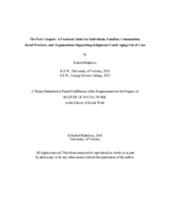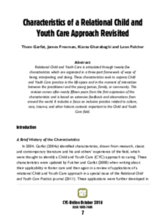Displaying 231 - 240 of 505
This research utilized Indigenous methodologies rooted in oral traditions, storytelling practices, and the Medicine Wheel teachings to examine how individuals, families, communities, social workers, and organizations can assist Indigenous youth who are aging-out of foster care and are transitioning into adulthood.
Nurturing Strangers focuses on loving nonviolent re-parenting of children in foster care. This book is a jargon-free mix of narrative and real-life case studies, together with the theory and practice of nonviolence.
This thesis aimed to systematically review literature on the types, measurement and effectiveness of residential staff training, focussed upon psychosocial outcomes.
This paper reports on an exploratory cross-sectional online survey of child protection service providers from five child protection agencies that investigates the struggles faced by child protection workers when responding to complaints made by acrimonious ex-partners within the context of child custody disputes.
This guidance report reviews the experience of and lessons learned from service provision in social welfare, child protection and childcare, health care, education and law enforcement. It presents methods, tools and service models that have proven effective in preventing and responding to corporal punishment.
Using the findings from a qualitative study, this paper explores social workers’ experiences of intervening in affluent families in the UK when there are child protection concerns.
In this paper, the urgent need to strengthen the child protection system in India is presented in the context of the Integrated Child Protection Scheme and relevant juvenile justice legislation.
This revision of Relational Child and Youth Care comes after nearly fifteen years from the first expression of the characteristics and is based on extensive feedback and observations from around the world.
This paper summarises how genetically-informed research designs can help disentangle genetic from environmental processes underlying psychopathology outcomes for children, and how this evidence can provide improved insights into the development of more effective preventative intervention targets for adoption and foster-care families.


